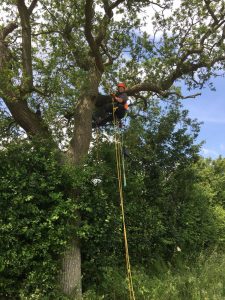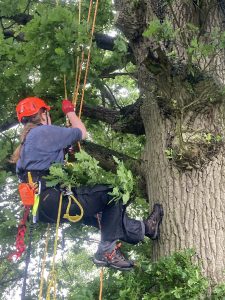Wild Frontier Ecology takes to the trees!
Two members of the WFE team can now be found swinging about the trees after successfully completing the City and Guilds NPTC Level 2 Award in Tree Climbing and Aerial Rescue.
In the beautiful grounds of Shrublands Hall near Ipswich, practice trees were roped up and ascended by one of our bat licensed Ecologists, Mary Goddard, and Arboriculturist Alex Lowe. Whilst the trees were smallish to start, their ambitions were large and soon they were scaling bigger and bigger trees with increasing “elegance” and “style”… Safety is always put first – they don’t really swing around the trees, it’s more controlled than that! WFE use the Double Rope Technique (DRT) for climbing, our climbers are fully kitted out with brand new LOLER compliant climbing gear and both have both passed First Aid training courses.
The climbing duo are now putting their skills to use looking for bat roosts in trees and aerial inspections for tree health and safety.
Bat roosts in trees
This method of surveying trees for bats can follow an Extended Phase 1 Habitat Survey where potential niches have been identified and the safety of the tree for climbing assessed. Where moderate and high potential trees that are safe to climb are identified, aerial inspection surveys can be undertaken to thoroughly examine potential roost features. This can substantially reduce the need for further survey work.
Dusk or dawn bat activity surveys for trees have a low success rate in terms of finding active roosts and can be especially difficult when trees are in leaf – which is the majority of the bat survey season. Climbing inspections, on the other hand, allow us to get up close and personal with potential niches and with the help of an endoscope, roosting bats can be observed directly or their droppings discovered and collected for analysis. Sometimes niches are found to be unsuitable for bats despite appearing suitable from the ground. In these cases, trees can be downgraded to low bat roost potential and further surveys no longer required, provided that best practice mitigation measures such as soft felling are followed.
Aerial tree inspections
Our new climbing abilities also allow us to better inspect features of concern following a tree risk assessment survey.
WFE’s Arboriculturist can undertake detailed ground level surveys of individual trees or systematic inspections of entire tree populations, identifying any features which may pose an unacceptable risk to people or property. If necessary, features of concern such as cavities, fungal decay or splits can be examined more closely through an aerial inspection to provide a more detailed understanding of the health and safety of a particular tree.
To find out more about WFE’s tree climbing services or enquire about our costs, please contact us at info@wildfrontier-ecology.co.uk or on 01328 855680.

